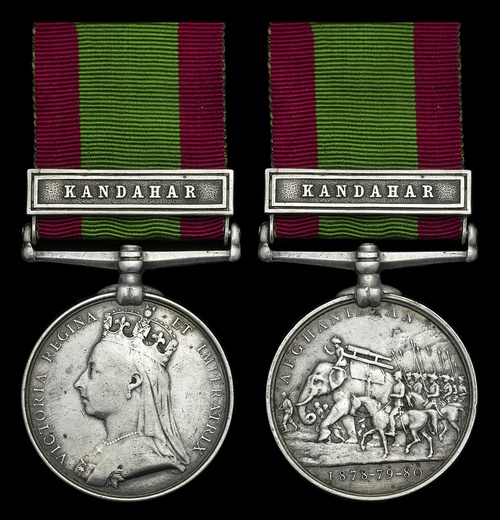
Auction: 24003 - Orders, Decorations and Medals
Lot: 235
The Battle of Maiwand survivor's Afghanistan Medal awarded to Driver A. C. Penny, E/B Battery, Royal Horse Artillery
Afghanistan 1878-80, 1 clasp, Kandahar (4122. Driv: A. C. Penny. E. Batt: B. Bde. R.H.A.), light contact wear overall, very fine
Albert Charles Penny was born at Staines on 15 November 1855, the son of Charles and Emma Penny of Knowle Green, Staines. He attested with the Royal Artillery at York on 9 November 1878, being posted to 'B' Brigade as a Driver. Posted to India the next year in December 1879 he was immediately thrust into service in the Second Afghan War with 'E' Battery.
This formation arrived at Kandahar on 5 April 1880 and was present there when news arrived that Ayub Khan had declared himself Emir and raised the city of Herat in revolt. The British needed to respond and so they send Brigadier-General Burrows with a Brigade assembled around E/B Battery and the 66th Foot to meet him near the Helmand River.
Maiwand
This force was to join the army of the Wali of Kandahar, Shere Ali, however when they arrived at Girishk- the site selected for the rendezvous- they discovered that the Wali's troops had mutinied. The Battery went into action alongside the 66th in suppressing the revolt and afterwards they contributed officers to help man the smoothbore guns captured in the action.
Continuing the march they encountered Ayub Khan's army as it manoeuvred through the hilly ground before the village of Maiwand. The British drew up for battle along a shallow ravine however the artillery pushed too far ahead and eventually the line needed to cross the ravine to protect the guns.
There then commenced a large-scale artillery duel which saw E/B battery in an unequal fight again Ayub's guns which were larger and more numerous. Meanwhile the Afghan army, much swelled by local Ghazis began to advance on the line, finding that the gulleys and defiles which ran out of the hills allowed them to move into small arms range unmolested.
The upshot of this is that the British found themselves in an exposed position under both sniper and artillery fire with little scope to properly respond. Two companies of Jacob's Rifles posted to the far left of the British line to reinforce the position lost most of their officers to this fire and broke under the pressure. At the same time Afghan cavalry appeared behind the line and their main force pressed forward, this combined with the sudden flight of so large a number of men caused the remaining troops to break.
The British left collapsed totally withdrawing across the plain towards the baggage train. The centre, where E/B battery were stationed held on, protected by a Company of the Madras Sapper's and Miners who attempted to hold but it became clear that the battle was lost and the called went up to save the guns. The Battery worked fast and despite the enemy about their ears manged to limber their guns and bring them to safety.
In the chaos 20 men of the battery were killed and another 13 wounded with one captured and later put to death. Penny escaped the melee unharmed and presumably aided the guns in unlimbering and opening fire from a safe distance to over the withdrawal of what remained of the Brigade. The only British troops who remained in the field were the 66th Foot who fought a series of stands in walled gardens around the nearby village of Khig, culminating in the stand of the famous Last Eleven whose bravery was hailed even by their adversaries.
Survivors
The Brigade made it safely back to Kandahar which soon came under siege from Ayub Khan's victorious army. The siege proved a sluggish and ultimately was raised by the arrival of General Roberts after his Kabul-Kandahar March.
E/B Battery was deployed in the resulting Battle of Kandahar, covering the advance of Baker's Brigade. With victory there the war ended, and the Battery was posted back to India in October. Whilst there Penny would doubtless have attended the parade at Poona which saw Patrick Mullane and James Collis awarded their V.C.s and 7 of the D.C.M.s for the action presented. This not including the D.C.M. awarded to Quartermaster Sergeant Munro who was presented his in a parade at Dublin (see: lot 236).
Penny was discharged at Umballa on 31 January 1900, with his intended place of residence described as 'Guard, R.M. Railway, Mhow'.
Sold together with copied research.
Further entitled to an Army L.S. & G.C.
Subject to 20% VAT on Buyer’s Premium. For more information please view Terms and Conditions for Buyers.
Sold for
£1,000
Starting price
£320




